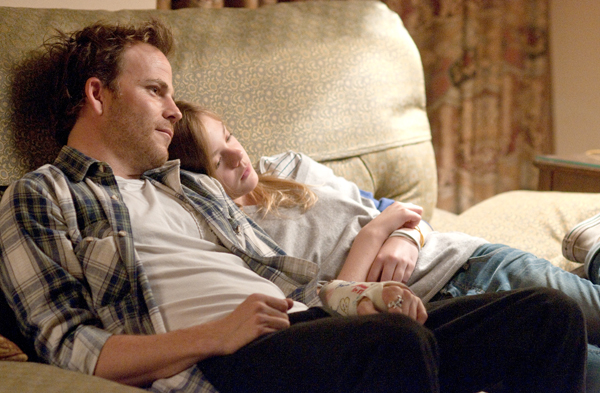|
Reviews of Recent Independent, Foreign, & Documentary Films in Theaters and DVD/Home Video

SOMEWHERE Exterior—an outdoor racing track somewhere in the outskirts of the San Fernando Valley—day: a wide shot of a concrete track in the desert, with no sign or sound of life until the murmur of an approaching motor. A sleek black Ferrari enters the right frame and speeds off to the left, disappearing in a second. The hum almost vanishes and then increases again. The vehicle zips through the static opening shot again and again. Metaphor-in-motion alert #1 and #2: someone is spinning his wheels, driving in circles. Sofia Coppola relentlessly returns to this theme, set in a rarefied Hollywood bubble. She examines the numbing minutiae of a sealed-off life within the Chateau Marmont, the simply furnished old Hollywood establishment where towering models roam the hallways. The first time we see inebriated movie star Johnny Marco (Stephen Dorff, never fitter) there, he’s stumbling down stairs, surrounded by his laughing entourage. Next scene: Johnny lies in bed, one arm in a cast. He’s an audience of one for a private performance of pole-dancing identical blonde twins. Strangely, he uses his one free hand to hold his cigarette, scrutinizing the women with the cold precision of an auditor or a collector. Watching their dance routine is more of a chore than an entertainment. Finally interacting with them when the session’s over to pay them, he gets their names wrong, which won’t be the first time. Most of the vignettes bleed into the other, reiterating what was said before. A lot, and yet nothing, happens. We know the answer to a fawning reporter’s lame question, “Who is Johnny Marco?” way before Johnny does. He lives his life on automatic pilot, obeying the directions of his managerial team, showing up (disheveled) to a press conference or patiently sitting still for a mold casting of his face. He’s equally treated and viewed as an object just as much he objectifies women. Pushing 40, he has the roguish charm of a Jack Nicholson, but his instant sexual appeal owes more to his star status and certainly not his way with words. The dialogue of the terse screenplay would take up only a few pages. Johnny is like Marcello Mastroianni’s detached observer in La Dolce Vita, though much more inert, both men searching for… they know not what. Instead of flaunting religious or political irreverence, Coppola soberly sticks to free-for-all decadence. As in Fellini’s film, there’s an angelic stand-in for grace, the antithesis to the anti-hero. Johnny’s 11-year-old daughter, Cleo (Elle Fanning), is the character most engaged to the larger world. She’s observant of her father’s behavior—to a point. He finds her unexpectedly on his doormat—her mom needs some time to herself. He has little choice but to take her with him to Milan on a publicity junket. La Scala? The Duomo? No. She and Johnny hang out in a super-deluxe suite with its own private swimming pool. It’s understandable that the father and daughter would lounge about eating ice cream watching Friends dubbed in Italian (though it doesn’t make the sitcom seem any better). But even 6,000 miles from home, Johnny bumps into a former one-night stand in the lobby. There are some astute observations. Decked out in a beautiful pink designer dress for an awards show, Cleo basks in her dad’s approval. And the film certainly captures Italy’s low-brow showgirl culture during this ceremony. What the film badly needs, though, is a jolting moment that takes the audience by surprise, save for when Johnny passes out during sex. Jessica Hausner proves in Lourdes that through a similarly minimalist, austere approach, just a small gesture has a startling impact, and micro-budget films like Daddy Longlegs or Tiny Furniture feature main characters that challenge the sympathies and test the patience of the audience. The film
will work best for those who buy into its implicit premise that if only
Johnny would connect, he would be happy. Value judgments aside, a
cuddled and pampered life of available sex right at your doorstep is
what many, no matter what age or income or gender, would find an
enviable trap. Johnny’s third-act existential crisis then comes across
as a dramatic requirement, not so much earned but needed to break the
repetitiveness. He can’t have all that sex or booze without remorse. But
for some, his life wouldn’t be a hedonist hell, but heaven.
Kent Turner
|

